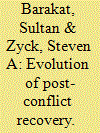| Srl | Item |
| 1 |
ID:
090204


|
|
|
|
|
| Publication |
2009.
|
| Summary/Abstract |
Recent history has been marked by the rise of post-conflict intervention as a component of military and foreign policy, as a form of humanitarianism and as a challenge to Westphalian notions of state sovereignty. The terms of debate, the history of the discipline and the evolution of scholarship and practice remain relatively under-examined, particularly in the post-9/11 period in which post-conflict recovery came to be construed as an extension of conflict and as a domain concerned principally with the national security of predominantly Western countries. The subsequent politicisation of post-conflict recovery and entry of post-conflict assistance into the political economy of conflict have fundamentally changed policy making and practice. The authors argue that research into post-conflict recovery, which must become increasingly rigorous and theoretically grounded, should detach itself from the myriad political agendas which have sought to impose themselves upon war-torn countries. The de-politicisation of post-conflict recovery, the authors conclude, may benefit from an increasingly structured 'architecture of integrated, directed recovery'.
|
|
|
|
|
|
|
|
|
|
|
|
|
|
|
|
| 2 |
ID:
188996


|
|
|
|
|
| Summary/Abstract |
Scholars have found that nonviolent resistance is more effective than violence at promoting post-campaign democratization. We explore whether this relationship extends to judicial systems, specifically. Courts have been shown to be important for promoting and protecting economic development and political rights, yet they have been largely ignored in quantitative studies of post-conflict democratization. We posit that leaders who hold power after domestic unrest will be more inclined to use independent courts as a mechanism to prevent future campaigns–but they do so primarily when fearing a significant mobilization threat and when expecting legal action to be an acceptable channel for dispute resolution by dissidents. As such, we anticipate that levels of judicial independence are higher following nonviolent campaigns as compared to violent conflicts. Using quantitative data from violent and nonviolent campaigns globally, we find that judicial independence is indeed higher in the aftermath of nonviolent, as compared to violent, resistance campaigns. Furthermore, a campaign’s outcome does not matter; post-conflict judicial independence appears to be associated with tactics, not dissident success.
|
|
|
|
|
|
|
|
|
|
|
|
|
|
|
|